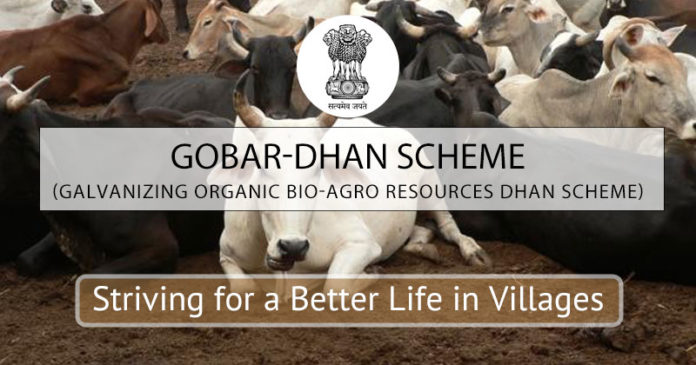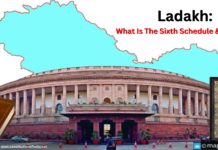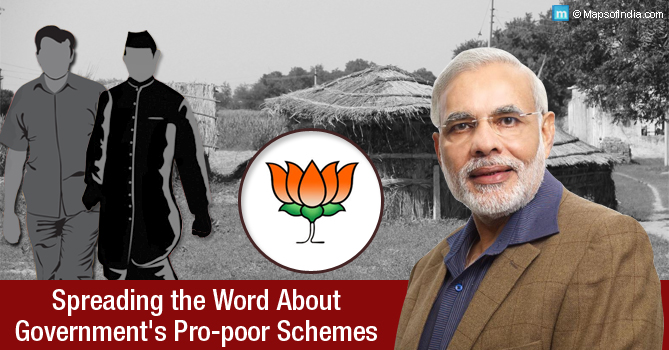The Galvanising Organic Bio-Agro Resources Dhan (GOBAR-DHAN) scheme was launched by Haryana’s Chief Minister Manohar Lal Khattar and Uma Bharti (Union Minister for Sanitation and Drinking Water) on 30th April this year at the National Dairy Research Institute (NDRI) Auditorium, Karnal. The scheme was first announced in the Union Budget session of 2018-19 by the then Finance Minister, Arun Jaitley.
The guidelines of this scheme were also launched on the same day specifying the implementation, arrangements, financing provisions and, roles and responsibilities of the Centre, State governments, districts and other stakeholders involved in the implementation of the scheme. The launch was attended by the sarpanches from the project villages, implementing agencies, officers and district officers from 14 states of India. With this new scheme, the government expects to bring new developments within the villages of India.
About GOBAR-DHAN Scheme
The GOBAR-DHAN scheme is an effort by the government to improve the living conditions in the Indian villages and make them open-defecation-free. A segment of the Swachh Bharat initiative, this scheme will focus on the useful conversion of waste into energy.
Under this scheme, the solid waste of the dung and fields will be converted into compost and fuels such as biogas and bio-CNG. The government has covered over 115 districts for the implementation of this scheme. As a part of the scheme, people will be educated about the right utilization of cattle dung for converting it into more valuable fuel, biogas, and manure. The scheme aims to gather cattle and solid waste from the farmers for sale to entrepreneurs, who will thereafter convert this waste into manure, biogas, and bio-CNG.
India is home to the highest cattle population in the world, which has about 30 crore cattle population producing about 30 lakh tonnes of cattle dung daily. Conversion of this much cattle dung into useful compost and fuels will make the nation free from pollution. Almost 5000 gaushalas with an average of over 400 cattle are included and 621 registered dairies are covered under this scheme. This will encourage the farmers to consider animal dung and other wastes not just as waste but as a source of income. The government, with the GOBAR-Dhan scheme, aims to produce cleaner fuels, eventually leading to a shift to biogas and bio-CNG.
Focus areas/aim of GOBAR-DHAN scheme
- Ensure cleanliness and sanitation in the villages of India.
- Generate energy and wealth from cattle dung and organic waste.
- Promotion of compost made of cattle dung and farm compost for agriculture.
- Utilisation and processing of the residue so that it can be converted into more usable forms of energy like bio
- CNG and biogas can be used by the villagers as clean fuel.
- Connect farmers to the buyers of the dung and agricultural waste so that farmers can get the right price for it.
- The scheme will make sure that everything is well-managed and processed in such a manner that the farmers in their farmlands can further use residual solid waste as compost fertilizer.
Benefits of GOBAR-DHAN scheme
- Villages will be clean and sanitized due to the removal of solid wastes.
- Helps in saving electricity and the environment too by causing less pollution.
- Create new rural livelihood opportunities for newer jobs linked to waste collection, transportation, biogas sales, etc., and enhance income for farmers and other rural people.
- The generation of biogas will help in increasing self-reliance in energy utilized for cooking and lighting.
- Improvement in the health of the livestock and farm yields.
The GOBAR-DHAN scheme is one of the main components of the Swachh Bharat Mission (Gramin) which comes as a saviour at this point, with its prime focus on keeping the Indian villages clean and generating energy from cattle waste, which is just a part of this Open-Defecation Free strategy. The scheme envisages the implementation of 700 biogas units in different states of the country in the year 2018-19.
Read Other’s Schemes As Well: Pahal Scheme | Jan Dhan Yojana | Skill India | Garib Kalyan Yojana | Schemes Launched by Modi Govt | Pradhan Mantri Jeevan Jyoti Bima Yojana (PMJJBY) | Pradhan Mantri Suraksha Bima Yojana (PMSBY) | Pradhan Mantri Kaushal Vikas Yojana | Pradhan Mantri Krishi Sinchai Yojana | Pradhan Mantri Awas Yojana (PMAY) | Pradhan Mantri Fasal Bima Yojana (PMFBY) | Atal Mission for Rejuvenation and Urban Transformation





